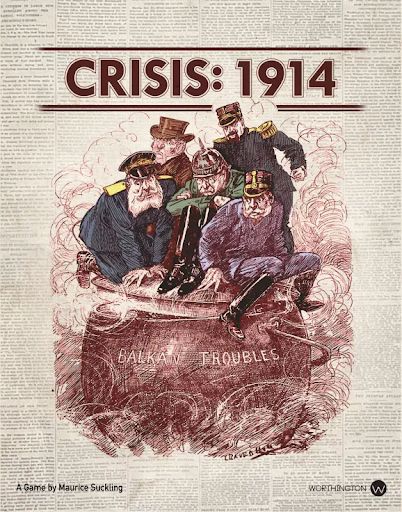
Crisis: 1914
Crisis: 1914 is a game of international brinkmanship - if you back down too soon, you lose. If you back down too late you lose.
But you also have hawks and doves in your cabinet and in your government, and out of these conflicting views you must somehow formulate a coherent response to the crisis to win the day and prevent war.
June 28, 1914, the assassination of Archduke Franz Ferdinand, and his wife, plunged Europe into a diplomatic crisis that turned into a war that engulfed the world. In some interpretations, this assassination lit a powder keg that had lain beneath the networked foundations of international relations for decades. But it didn’t have to be this way. The central contention of Crisis: 1914 is that, for all the festering tension, war was avoidable.
The game puts players in the shoes of the highest profile statesmen, representing the nations of Germany, Austria-Hungary, Russia, France, and Great Britain. This became known as the July Crisis. Prestige comes from applying diplomatic pressure - gauge this just right and you will weather the crisis with skill and be declared the winner. Apply too little diplomatic pressure and you will lose. Apply too much diplomatic pressure and you will not only lose, but also be the one to blame for unleashing the Great War.
Overview
Designed for 1 to 5 players with a solitaire engine, and playable in under 2 hours.
There are 3 interrelated concepts at the heart of Crisis: 1914: Prestige, Tension, and Diplomatic Pressure (DP).
Prestige is how you win. The player with the most Prestige at the end of the game is the winner.
Diplomatic Pressure (DP) is how you score Prestige. Every card has a DP value. You apply DP by playing cards. The player with the most Prestige at the end of a turn earns Prestige points. There are other ways of scoring Prestige points too, but this is the most important one.
Tension is how you lose. If you end a turn in the red zone on the Score Track you are also creating Tension for your opponents which reflects how close you are to provoking them into mobilizing for war. If you provoke them too far war starts, and you lose.
Cards drive the game. There are various card types, and playing the right card at the right time will affect nations. Some of the card types are:
Assertion Cards- which uses your nation's power to increases your Prestige
Consensus and National Interests Cards- these allow your nation to play more cards
Diplomatic Back-Channel Cards - these let you increase DP without increasing Tension
Caution Cards - allow more cards to be drawn
In addition, some cards have recurring effects on Momentum, which stops players from performing certain actions and Reduce Tension which lets you lower Tension in your country.
Contents
- 1 hard mounted game board
- 120 deluxe player cards (5 decks of 24 cards, one per nation)
- 5 player boards
- 1 Calendar Track marker
- 1 Turn Track marker
- 5 Initiative markers
- 10 Current Score markers
- 3 player board markers
- 20 white Prestige dice
- 8 red Tension dice
- 5 Belligerence track markers
- 1 rule book
- 1 Playbook with extensive historical details on the diplomats, events, and history of the crisis. Also, designer notes and reference materials.
- Custom Tray

Rockin' B Games is a family owned and operated small business established in the Fall of 2010.
In Cart / Check-out Discounts
Receive the following discount at checkout when your order exceeds:
$50 take 5% off | $75 take 10% off | $100 take 15% off
Discounts are applied automatically. No code required.
Store Policies
Primary topic links can be found at the bottom of this page. A complete policy section can be reviewed at: Policies
